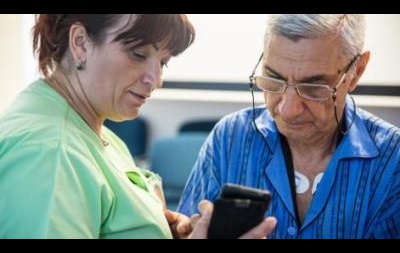We're using new mobile and internet technology to revolutionise the way healthcare is delivered across Europe.
 Much of what we now take for granted in our digital lives would have been unimaginable a decade ago. It’s clear the next wave of innovation in digital communications will bring dramatic changes to our daily lives, particularly in the way we think about and receive healthcare. E-health experts from our School of Computing are shaping that future.
Much of what we now take for granted in our digital lives would have been unimaginable a decade ago. It’s clear the next wave of innovation in digital communications will bring dramatic changes to our daily lives, particularly in the way we think about and receive healthcare. E-health experts from our School of Computing are shaping that future.
A series of projects have already explored the use of cloud-based platforms to better store and share health records, giving patients and their families greater control over their own data. They’ve also shown how potentially life-saving information can be shared instantly between health professionals and social services, rather than being physically transported between primary care providers and hospitals.
Now work is well underway into a €17m future internet project called Fi-STAR. Funded by the European commission, it is aimed at using the latest mobile and internet technology to revolutionise the way healthcare is delivered across Europe.
Think about it like a base of Lego building blocks that new customised applications can be built on top of... existing software elements can be re-used like spare parts of an old car
New customised applications
The work is part of a €600m initiative focused on creating reusable software applications that can be customised for any kind of health use – reducing reliance on costly annual software updates from IT giants like Microsoft and Apple.
“Think about it like a base of Lego building blocks that new customised applications can be built on top of” said Professor Christoph Thuemmler. “It means that existing software elements that you have purchased can be re-used like spare parts of an old car.”
He and his team, which includes interaction design expert Dr Oli Mival, are project managing seven user case studies across Europe where new technology is being trialled. They include:
- using smart phones to radically improve the lives of rural diabetes patients in Norway’s Arctic Circle by streaming real-time sensory data to healthcare professionals
- using 2-D bar coding in Yorkshire to prevent error and fraud in wholesale pharmacy supply
- creating an online cardiology service for people with heart failure in Romania
Fi-STAR is also spearheading a fundamentally different ‘reverse cloud’ approach – bringing re-usable software applications to data instead of uploading data into software applications based in the cloud. A move, said Professor Thuemmler, that will improve data protection for individuals, no matter where they are in Europe.
Interested in this project? Contact Professor Christoph Thuemmler.